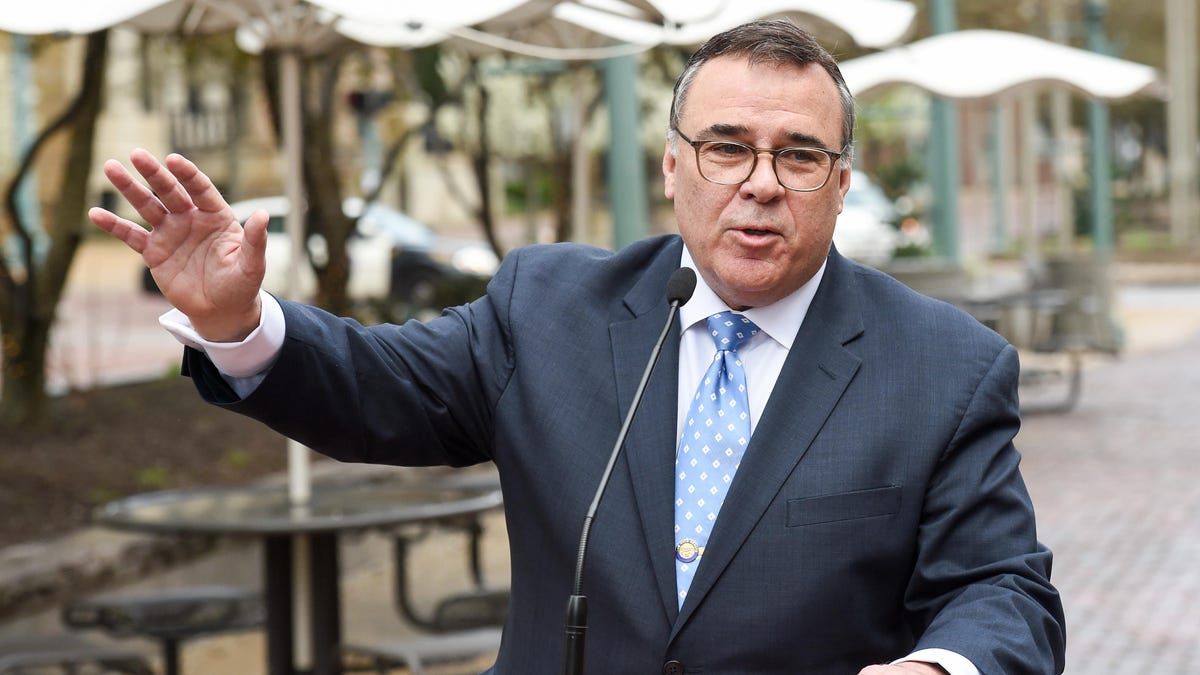Montana
Montana GOP Senate Candidate Embraces A Seriously Toxic Position

If GOP Senate hopeful Tim Sheehy wanted to know how advocating for transferring control of federal lands to states goes over in a place like Montana, all he had to do was look at the last Republican to take a run at Democratic Sen. Jon Tester.
Rep. Matt Rosendale (R-Mont.) found out during his 2018 bid for Senate that it is an appallingly unpopular position.
Rosendale embraced federal land transfer as a candidate for the House in 2014, going as far as to call for a Montana takeover of all Forest Service and Bureau of Land Management lands within Montana’s borders. At a Republican debate that year, he dismissed federal lands as unconstitutional and said, “I believe that the citizens of Montana should have control and management of those areas, instead of the federal government.”
But by the time Rosendale ran for Senate four years later, he’d clearly heard an earful from his constituents. In a Billings Gazette op-ed in April 2018, he wrote, “I’ve listened to the people of Montana and they mean business about protecting our public lands, opposing a federal lands transfer.” He added a section to his campaign website titled “Protect Our Public Lands,” in which he declared his belief that “our public lands must always stay in public hands.” And during a candidate debate, Rosendale acknowledged that “there was a time when I thought they could be better managed by the state,” but said he “talked to people all over the state and they’ve made it exceedingly clear that they do not want those lands transferred. And I not only understand that; I agree with that.”
Rosendale, who is considering a second Senate campaign against Tester, has since sponsored anti-public-lands legislation.
Montana is 35% federally owned. Poll after poll shows that voters in Western states, including Montana, overwhelmingly oppose transferring control or selling off federal lands.
None of this has kept Sheehy, a decorated military veteran and millionaire businessman, from making the same mistake as Rosendale.
“Local control has to be returned,” Sheehy told the Working Ranch Radio Show earlier this month. “Whether that means, you know, some of these public lands get turned over to state agencies, or even counties, or whether those decisions are made by a local landlord instead of by, you know, federal fiat a few thousand miles away. Local control will almost always produce better results than a federal mandate from bureaucrats who are unaccountable to the people that are ultimately subject to these regulations.”
While federal agencies are headquartered in Washington, D.C., most land management decisions are made by local field offices.
William Campbell/Corbis via Getty Images
When HuffPost contacted Sheehy’s campaign about the radio interview, spokesperson Katie Martin tried to walk back what sounded like a full embrace of federal land transfer.
“Tim believes Montanans know best how to manage our land, not the Washington bureaucrats,” the spokesperson said via email. “Tim supports more local control and less federal mandates. Tim opposes a federal transfer of our public lands. Tim opposes the sale of our public lands. Tim supports better management and more local control of our public lands.”
When asked how federal lands being “turned over” to states — Sheehy’s words — differs from “transferring” them, Sheehy’s campaign said, “Calling for better management and more local control is not the same as “transferring them.”
Sheehy’s attempt to walk the line here mirrors a yearslong shift within the pro-transfer movement. As HuffPost previously reported, conservatives have largely been forced to abandon brazen calls for outright transfer and sale ― at least publicly — instead embracing savvier tactics aimed at achieving many of the same industry-friendly goals that would come with stripping lands from federal control. That has included supporting federal-state agreements that would give states a greater role in public land management and pushing permitting reform legislation aimed at giving states the authority to manage oil, gas and other energy development across the federal estate ― a de facto transfer of control that would establish federal lands in name only.
In that same radio interview, Sheehy condemned federal agencies, specifically the Bureau of Land Management and the Department of Agriculture, accusing them of being “hijacked, in many cases, by bureaucrats who are carrying out a political agenda.” And he railed against efforts to put additional federal lands into conservation. In May, the BLM unveiled a draft rule that would place conservation “on equal footing” with energy development and other traditional uses, including by granting the agency the authority to issue “conservation leases” to promote land protection and ecosystem restoration. Cattle ranchers have pushed back against the proposal, saying it would “upend” land management in the West.
“Instead of supporting the producers that they’re supposed to be enabling, they are putting constrictions in place that could potentially put them out of business,” Sheehy said. “So taking some of these leases, you know, out of agricultural production and moving them into conservation is deeply concerning. … We’re seeing battles take place all over the country, from Nevada to Washington to Montana, about what that really means.”
The most famous battle over land rights in Nevada was the 2014 armed standoff that notorious rancher Cliven Bundy led in Bunkerville over fees he refused to pay for grazing cattle on federal lands. It is not clear if Sheehy was referring to that incident. His campaign did not address several of HuffPost’s specific questions.
The Bundy family has long advocated for a state takeover of federal lands.
Sheehy himself is a fledgling rancher. In 2020, he and his friend, former Navy SEAL Greg Putnam, started the Little Belt Cattle Company in Martinsdale, Montana. Today, the company actively ranches approximately 30,000 private and leased acres and owns 2,000 cattle.
Sheehy is digging in on a position he outlined early in his bid to flip Tester’s seat. On his campaign website, Sheehy writes that he has “a unique perspective on what the federal government is failing to address when it comes to tackling wildfires—they need to let Montana start managing our federal lands.”
Federal acres belong to all Americans, not just residents of the state where they are located.
Western voters have made their views on pawning off public lands abundantly clear. Released in 2017, a poll by the Center for American Progress found that 64% of Donald Trump voters opposed privatizing or selling off public lands. A survey by Colorado College in 2016 found that 60% of voters in seven Western states, including 59% of Montanans, opposed selling off significant federal land holdings. And a 2016 poll by Colorado-based conservation group Center for Western Priorities found that 63% of Montana voters would be less likely to vote for a candidate who supported selling public lands to reduce the budget deficit, compared with 20% who said they’d be more likely to support such a candidate.
Aaron Weiss, deputy director at the Center for Western Priorities, told HuffPost that the issue became “such a third rail that candidates across the West generally stopped going there” — and pollsters largely quit posing such direct questions.
“It’s incredibly consistent over the years and not even close,” he said of public opposition. “This is not like an issue that is on the margin for Montana voters. They are very clearly against transferring or selling off public lands.”
Weiss stressed that transferring control of federal lands to states would ultimately lead to their privatization.
“States and counties have to run balanced budgets, and we know the amount of money that the federal government spends just on firefighting alone on national public lands would bankrupt just about every Western state,” he said. “That’s not even getting into the other land management costs that go into managing large swaths of public land in keeping them public.”
“The inevitable outcome of any of these land transfer proposals, as much as folks try to frame them as, ‘Oh, this is just going to be a state issue,’ inevitably it leads to selling off and privatizing public lands because there is no way for states to handle the management costs,” he added. “Full stop.”
Both the Montana Republican Party and national Republican Party platforms support transferring federal acres to the states.
Sheehy may simply be towing the party line — something he has gotten quite good at since launching his campaign in June. But he is likely to soon find out just how problematic his recent comments can be for someone seeking political office in Big Sky Country.

Montana
Brawl of the Wild Replay: No. 9 Montana at No. 2 Montana State

BOZEMAN — Second-ranked Montana State was seeking regular-season perfection when it welcomed rival Montana to Bobcat Stadium on Saturday, Nov. 23, 2024.
The Bobcats entered the 123rd Brawl of the Wild with an 11-0 overall record with a chance to finish 12-0 for the first time in program history and also win the outright Big Sky Conference championship.
The ninth-ranked Grizzlies, meanwhile, were 8-3 and aiming to play spoiler for Montana State while also improving their own seeding for the FCS playoffs.
Watch a condensed replay of the game between No. 2 Montana State and No. 9 Montana in the video above.
Montana
‘Yellowstone’ highlights influence behind a changing Montana

The popular “Yellowstone” TV series, set and filmed in Montana, taps into a lesser-known chapter of the state’s history: its settlement by Confederates and ex-Confederates during and after the Civil War.
I come to this story with a unique perspective. I’m a fourth-generation Montanan. I’m also a scholar of U.S. Western literary and cultural studies and left the state in my 20s to pursue a career in academia.
Then, during the pandemic, I returned to Montana for a time to lead a statewide cultural organization that connects Montana’s history and literature to its modern-day residents.
That’s why, for me, the story of the show’s protagonist, John Dutton III, who heads a wealthy-but-embattled Montana ranching family, is not just a cultural phenomenon. Rather, “Yellowstone” offers insights into the dynamics that are currently influencing a changing Montana.
Montana’s little-known legacy
One of the series’ prequels, “1883,” provides the crucial backstory for the Dutton family’s journey to Montana.
James Dutton, portrayed by Tim McGraw, was a former Confederate captain; his wife, Maggie, was a nurse for the Confederate Army. In leaving behind their war-torn lives to seek new opportunities, they mirror the historical trend that saw Confederate settlers moving West during and after the Civil War.
According to Montana historian and scholar Ken Robison, Confederate prisoners of war languishing in Union prisons were paroled to western territories like Montana. By 1864, two such parolees had discovered gold in what is still called Confederate Gulch, at the time one of the largest settlements in Montana Territory. Other settlements, such as Dixie Town and Jeff Davis Gulch, dotted the landscape. Montana’s territorial capital was briefly called Varina, named after the Confederate president’s wife.
Although there is no way to know for certain, it’s possible that during the latter half of the war, half of Montana Territory’s residents — maybe 30,000 — were pro-secession. Some had been in Confederate service; the rest shared their sentiments.
After the war, many of those Confederates stayed. By the late 1800s, Montana was home to 13 United Confederate Veterans organizations totaling 176 members. In 1916, the Montana Chapter of the Daughters of the Confederacy erected a Confederate memorial in Helena, the state capital; it stood for a century. The 1920s saw the rise of about 40 Ku Klux Klan chapters across the state to promote xenophobic policies against immigrants and racist policies against nonwhites. Today, Montana remains one of the whitest states in the U.S. — about 85% of Montanans are white; less than 1% are Black.
Recasting the ‘Lost Cause’
Numerous historical echoes surface briefly in “Yellowstone.”
In Season 2, there’s a violent confrontation involving a militia group that displays Confederate and “Don’t Tread on Me” flags. This subplot speaks to Montana’s long history as a hub for populist and anti-government movements. The Southern Poverty Law Center reports that Montana has 17 hate and anti-government groups, which include three defined as white supremacist or neo-Nazi.
This depiction of militia groups in “Yellowstone” represents the broader history of populist resistance in the American West. From the Sagebrush Rebellion of the 1970s to the Montana Freemen’s standoff with federal agents in the 1990s, Westerners have often resisted federal control over land and resources — tensions that perhaps trace back to the Confederacy’s own secession, a resistance rooted in defiance of federal authority, particularly over slavery.
After the Confederacy’s defeat, the “Lost Cause” narrative, in an attempt to preserve Southern pride, recast the South’s secession as a fight for states’ rights, and not a defense of slavery.
Those Lost Cause connections reverberate through John Dutton III’s relentless battle to preserve his family’s ranch. Fighting overwhelming political and economic pressures, Dutton remains steadfast in his determination to hold onto the land, even when it goes against his best interests.
This tenacity reflects the Lost Cause mindset — a clinging to a nostalgia-tinged, yet unattainable, past. Dutton embodies the archetype of the “aggrieved white man,” a figure central to many populist movements, who feels displaced from his former position of power in politics, work and family life.
Populist contradictions
It’s hard to discern to what degree recent changes in Montana can be attributed to “Yellowstone.” What is certain: Today’s longtime Montana residents find themselves exposed to a fresh set of political, economic and cultural forces.
Tourism and the local economy are up, due in part to the “Yellowstone” effect. But so are concerns about the rising costs of most everything, particularly houses.
These trends have been spurred, in part, by outsiders moving to Montana — newcomers who romanticize the state’s hardscrabble past and what they perceive as its current rough-hewn lifestyle.
What’s more, Montana has morphed from a purple state known for its political independence into a reliably conservative stronghold.
The drastic shift from purple to red solidified in 2020 with the election of a Republican governor after 16 years of Democratic leadership. It was further underscored by the defeat of Democratic Sen. Jon Tester by Republican Tim Sheehy in the 2024 election.
In “Yellowstone,” as Dutton is sworn in as Montana’s new Republican governor, he tells his constituents that he is “the opposite of progress” in response to changes that outside influences are bringing to the state.
Yet the politics of “Yellowstone” are “hard to pin down,” and the Duttons themselves espouse various versions of left- and right-wing populism as they simultaneously battle and embody the political and economic elite.
By the same token, Montanans resent wealthy outsiders but have given them political power by voting them into office.
Montana’s current governor, Greg Gianforte, is a tech millionaire, originally from Pennsylvania; Sheehy, similarly, is a wealthy out-of-stater.
Neither one might approve of the fictional Gov. Dutton’s proposed policy of doubling property and sales taxes for out-of-state “transplants” — though many Montanans probably would. For some, the rapid changes of the past few years have been, like life for the Dutton family, a challenge.
Randi Lynn Tanglen served as professor of English at Austin College in Texas (2008-2020), executive director of Humanities Montana (2020-2022), and is currently vice provost for faculty affairs at the University of North Dakota (2023-present). She holds degrees from Rocky Mountain College, the University of Montana and the University of Arizona.
Montana
No. 2 Montana State whips No. 9 Montana 34-11, clinches 12-0 regular season

BOZEMAN — The only thing that could have made this football season any sweeter for Montana State was the one thing that remained on its list of regular-season expectations.
Against their arch nemesis on Saturday, the Bobcats didn’t blink.
Adam Jones rushed for 197 yards and two touchdowns, the defense rose up and No. 2-ranked MSU took care of ninth-ranked Montana 34-11 to win the 123rd Brawl of the Wild at Bobcat Stadium.
Slim Kimmel / MTN Sports
With the win, the Bobcats clinched a perfect regular season at 12-0, won the outright Big Sky Conference title with an 8-0 league mark and in all likelihood secured a top-two seed and home-field advantage for the upcoming FCS playoffs — if not the overall No. 1 seed.
Though their running back corps was diminished with both Scottre Humphrey and Julius Davis in street clothes on the sideline, the Bobcats still rushed for 326 yards with Jones, a redshirt freshman out of Missoula Sentinel, leading the way.
The home team has now won five in a row in the storied history of the Cat-Griz rivalry, and Montana State has still not lost a regular-season home game in the four-year tenure of coach Brent Vigen.
Slim Kimmel / MTN Sports

The Bobcats established their running game at the outset by marching 75 yards on 14 plays, 12 of which were runs. Mellott capped the drive with a 5-yard touchdown run on what appeared to be a broken play to put MSU ahead 7-0.
MSU converted two third downs on that drive and took nearly nine minutes off the clock.
A promising Griz drive was slowed by penalties in the second quarter, but Ty Morrison got Montana on the board by splitting the uprights on a 47-yard field goal to make the score 7-3.
But the Bobcats stretched their lead on the next possession when Mellott dropped a pretty pass over the top to tight end Rohan Jones for a 35-yard touchdown at the 10:16 mark of the second quarter.
Toward the end of the first half, the Bobcats got a 27-yard field goal from Myles Sansted to extend the lead to 17-3. With an even bigger kick, Sansted drilled a 49-yarder as time expired at halftime to extend it to 20-3.
Each team’s defense rose up in the second half as the offenses combined for five consecutive fruitless possessions. But with the Bobcats backed up on their own 5-yard line, Adam Jones exploded took a handoff and exploded through the line for an 88-yard gain.

Slim Kimmel / MTN Sports
Two plays later Jones punched it into the end zone from the 3 to put the Bobcats ahead 27-3 toward the end of the third quarter.
As the weather started to take a turn with strong wind and snow flurries, Montana scored its first touchdown early in the fourth on a 1-yard rush by Eli Gillman. Sawyer Racanelli then made a one-handed catch while being interfered with for a two-point conversion.
Jones, though, capped a 9-play, 71-yard drive with a 2-yard TD run with 4:49 remaining to ice the game.
The Grizzlies own the all-time series with a 74-43-5 record, but the Bobcats now have the edge with an 11-10 mark since 2002.
Turning point: The game had hit a defensive standstill in the third quarter until Jones’ 88-yard burst to the UM 7. Griz safety Jaxon Lee prevented a touchdown, but two plays later Jones was in the end zone and the Bobcats had a 27-3 lead with 1:55 remaining in the third.
Stat of the game: The Bobcats rushed for more than 300 yards again, but perhaps more important was the defense’s ability to get off the field on third down.
Slim Kimmel / MTN Sports

MSU’s defense held the Grizzlies to a 2 for 12 success rate on third down and forced seven punts. In the end, the Bobcats limited Montana’s offense to 234 total yards.
Game balls: MSU RB Adam Jones (Offense). Davis was injured in the first quarter and didn’t return and Humphrey had just one attempt, so Jones was called up on to take the brunt of the carries. He delivered with a standout performance.
MSU S Rylan Ortt (Defense). The Bobcats defense played a great game overall, and Ortt was one of the ringleaders with 11 tackles (eight solo), was in on a tackle for loss and had one quarterback hurry.
MSU PK Myles Sansted (Special teams). Sansted hit both of his field goal tries, and his 49-yarder as time expired in the first half allowed MSU to take a 17-point lead into the locker room.
What’s next: With a 12-0 record, Montana State is in line for a top-two seed in the FCS playoffs, which would mean a first-round bye and home-field advantage through the semifinal round. The Cats could get the No. 1 overall seed after South Dakota beat North Dakota State 29-28.
The Grizzlies, who are now 8-4 (and 5-3 in the Big Sky), are likely to receive an at-large bid into the tournament.
The 24-team bracket will be announced Sunday with the 2024 NCAA Division I Championship Selection Show on Sunday at 10:30 p.m. Mountain time on ESPNU. The show is also available for streaming on ESPN+.
-

 Business1 week ago
Business1 week agoColumn: Molly White's message for journalists going freelance — be ready for the pitfalls
-

 Science5 days ago
Science5 days agoTrump nominates Dr. Oz to head Medicare and Medicaid and help take on 'illness industrial complex'
-

 Politics7 days ago
Politics7 days agoTrump taps FCC member Brendan Carr to lead agency: 'Warrior for Free Speech'
-
/cdn.vox-cdn.com/uploads/chorus_asset/file/25739950/247386_Elon_Musk_Open_AI_CVirginia.jpg)
/cdn.vox-cdn.com/uploads/chorus_asset/file/25739950/247386_Elon_Musk_Open_AI_CVirginia.jpg) Technology6 days ago
Technology6 days agoInside Elon Musk’s messy breakup with OpenAI
-

 Lifestyle7 days ago
Lifestyle7 days agoSome in the U.S. farm industry are alarmed by Trump's embrace of RFK Jr. and tariffs
-

 World7 days ago
World7 days agoProtesters in Slovakia rally against Robert Fico’s populist government
-

 News6 days ago
News6 days agoThey disagree about a lot, but these singers figure out how to stay in harmony
-

 News7 days ago
News7 days agoGaetz-gate: Navigating the President-elect's most baffling Cabinet pick



















